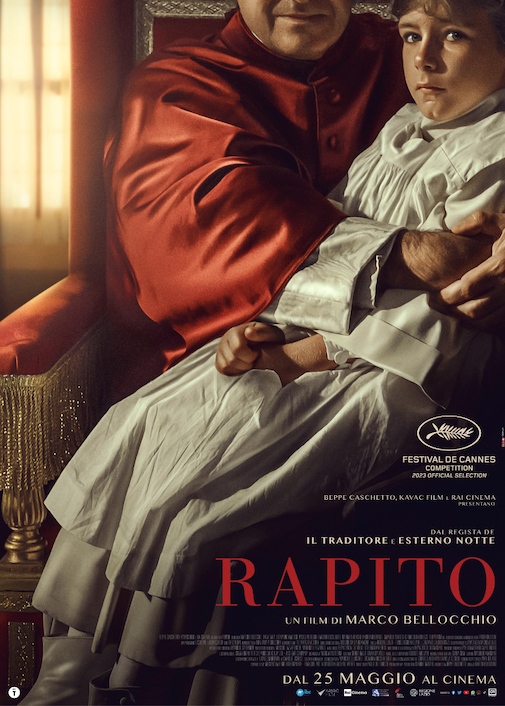TIFF '23: "The New Boy" and "Kidnapped"
 Sunday, September 17, 2023 at 10:35AM
Sunday, September 17, 2023 at 10:35AM 

A boy contemplates Jesus on the cross, the figure's perpetual suffering a striking sight. Because he's not been raised Christian, the youth relates more to the depicted pain than the iconography's meaning. In a show of naïve empathy that others would read as sacrilegious, he frees Christ, ripping the nails out of the cross. Whether the son of god's body tumbles a wooden fall or walks away reborn depends on the film, but the basic premise of these scenes ties Warwick Thornton's The New Boy and Marco Bellocchio's Kidnapped together.
Both films consider historical atrocities done in the name of good, unmoored children at the center of a religious storm. Thornton sees a fictional aboriginal boy as a synecdoche for his colonized people, while the Italian master dramatizes the real-life episode of a Jewish boy taken from his family…
THE NEW BOY, Warwick Thornton
In the Australian outback, sometime in the 1940s, a nine-year-old Indigenous boy is captured by police, abducted for all intents and purposes. From the wilderness he called home, the boy is insinuated into the systematic erasure of his people, a concerted effort to root out their cultural identity and force the assimilation of natives into the colonial white society. The church played a huge part in this historical injustice, and it's to a supposed house of god that our nameless protagonist is taken. He shall learn and transform at a squalid monastery, lost in the middle of nowhere.
He shall become a good Christian boy, ready to sacrifice for king and country, renounce everything he knew and loved. He shall be another cog in the machine, a body to be exploited. It's a violent process made more insidious by the mask of kindness oppression wears. Here, she's Sister Eileen, a brusque nun with bandaged feet that attract flies and the stench of booze wafting about. In the absence of a priest whose death is kept secret to the outside world, she's the apparent leader of her self-contained community, comprising other 'rescued' boys, a fellow nun, and a gruff handyman.
Together, they persevere in the Australian landscape, surviving its harshness while sweating through habits envisioned for colder climates. It's not an openly miserable existence, but the feeling of wrongness pervades the air. At the center of it all, the relationship between Sister Eileen and her new ward grows more complicated with every scene, wavering between a child's devotion to his apparent savior and prickly distrust. Sometimes, she reads like a pragmatic maternal presence, a guardian with no time for nonsense. Still, the inkling of miracles unbounds a fevered pitch in her demeanor, only to collapse and rebuild itself in a tormented cycle.
Their dynamic is intensified through Thornton and his actors' approach to these two magnetic poles within the drama. They're both eminently demonstrative, but while it's easy to understand Sister Eileen's internal mess, the boy's interiority remains enigmatic. Not that young Aswan Reid's performance is notably opaque. Even with little dialogue, there's immense openness to his emotional registers, projected with blinding brightness to those brave enough to look. However, his character is founded on cultural specificities that outside forces did everything to erase.
At a particular stage in the drama, one realizes that there's a point of inaccessibility to his reality due to the historical consequences we're living as spectators, the outcome of a colonial process. Painfully, the audience may have an easier time comprehending the insanity that Cate Blanchett brings to her role, using her star charisma to coax us into affection while revealing the essential flaws in someone who, trying to do good, is ultimately an instrument of evil. Blanchett, who feels like she's being challenged for the first time in a while, brings a Fordian element to The New Boy that recalls that American master's last film, 7 Women.
Thornton's lensing is also keen on exploring the Western aesthetic made possible by the clash of broad landscapes and church-like structures. Working as his own cinematographer, the director performs miracles fated to thrive on the biggest screen possible. Yet, the boldest formal gestures reside in the soundscape of The New Boy. One thinks of the battling sounds of wartime radio and the wind's howl, or how Warren Ellis' score gives musical shape to the outback's grandeur, threat, and wonder. If you love landscape cinema, this one's for you, the bush celebrated through multiple audiovisual avenues.
From sonic duels to actorly contrasts, this spectacle of an atrocious past culminates in a breathtaking sequence that goes a long way in justifying The New Boy's odd penchant for magical realism – even if it doesn't excuse some subpar supporting CGI. I wouldn't want to spoil the moment if it weren't so central to how one perceives the film that preceded it, contextualizing Baptism as an unholy sacrament. Instead of a spiritual rebirth, the act is presented as a death, a severing and apocalyptic disconnection. It's a radical notion, echoed in that other Cannes to Toronto title.
KIDNAPPED, Marco Bellocchio
When he was only a babe, Edgardo Mortara was secretly baptized by one of his family's servants. Six years later, when church authorities learned of this, they fell on the Mortara family, taking their boy to be raised Catholic. Such horrors were legal in mid-19th century Italy - specificcaly, in the Papal States - where this heinous process would break Jewish families apart, effectively stealing the next generation into forced Christianity. To tell the story of a sickening system, Marco Bellocchio, erstwhile vanguardist of the 1960s Italian cinema, turns to painterly classicism, where a stately presentation coexists with the firebrand emotions of a melodrama ripped straight from the historical record.
The director's career has long moved into old-fashioned ritual, a filmmaker more eager to uphold convention than to defy it as he once did. And yet, while one might criticize his form for being a tad stale, it's hard to deny the mastery with which well-worn strategies are given a new life. Moreover, by presenting Kidnapped as a piece of Italian visual art ossified within centuries-old academism, Bellocchio posits that the Mortara's tragedy is an essential part of his country's legacy – a fresco that should be regarded with as much attention as Leonardo’s Last Supper or any of Caravaggio's shadowy stagings.
Rather than a footnote in some history book, the terrible tale comes alive in operatic shape for the big screen, screaming its sorrow through Fabio Massimo Capogrosso's aggressive score. Fury pulsates through the cinematic organism, indignation curdled over a century of silence, during which the architect of much of this unhappiness, Pius IX, was beatified by John Paul II. Because it's packaged in such beautiful compositions and oil paint light, serenity visualized, that outrage only becomes more potent. It's a mighty force pressurized into a single point, ready to explode all over the screen, bomb-like.
At one point, Steven Spielberg was supposed to film the Mortara's history, and, though I'll never deny the American cineaste's mastery, it seems fitting that Bellocchio's the one whose project saw the light of day. His sprawling vista of Italian internal politics feels specific to a national perspective, especially his scathing portrayal of religious authority. There's also the connective tissue between the drama and the surge of the Risorgimiento in times of unification – brought to a peak during the famed Porta Pia breach. As someone who has struggled to get into the director's cinema, Kidnapped proved an emotionally fraught surprise. Looking back, I'm shocked it won nothing from the Cannes jury. Oh well, better luck next time, Master Bellocchio.
Kidnapped is one of the finalists for the Italian Oscar submission. No US Distribution for other title has been announced yet.



Reader Comments (3)
It's worth clarifying that the horrors referred to in the review of Rapito were NOT "legal in mid-19th century Italy." They were legal in the Papal States. Italy was not unified at the time of the kidnapping and, if anything, local opposition to the kidnapping helped lead to the collapse of the Papal States and the willingness of other European powers, particularly France, to let the Italian revolutionaries achieve unification (a process that had come to a standstill in 1848 when France intervened militarily to suppress the revolution and reinstall the Pope as temporal ruler of the Papal States). I suspect that some of the film's underlying themes will elude audiences unfamiliar with Italy's history. And it's not that Bellocchio beat Spielberg to the finish line. Bellocchio made it clear that he moved forward with his film only after ascertaining that Spielberg had abandoned his project. What caused Spielberg to backtrack? Possibly new evidence that emerged suggesting that Mortara remained grateful for having been abducted and put on the path that led him to the priesthood and a long life in the service of the Catholic church. Ironically, Mortara died in Belgium shortly before the Nazi occupation in WW2. Although a devout Catholic priest, his religious faith and willingness to alienate his family would probably not have given him a free pass from persecution. It would be fascinating to read the unproduced screenplay that Tony Kushner is said to have completed for Spielberg's project.
https://variety.com/2023/film/global/marco-bellocchio-kidnapped-jewish-boy-abducted-by-the-church-steven-spielberg-1235621108/
DAVIDE -- I'm trying to keep things brief with these capsule-esque festival reviews. However, you are correct in everything you say - though I'd argue the Papal States were still part of Italy, even if what we now know as modern Italy would only emerge with the long process of unification. Indeed, I think RAPITO would make an interesting double feature with THE LEOPARD, probably the best-known movie about the Risorgimento, where we see a different perspective on the same era, philtered through the matters of distant aristocracy rather than religious strife. It's such a fascinating point in European, not just Italian, history.
Regarding Spielberg, I should have probably worded it better. However, I'm still glad with got Bellocchio's political-minded fresco instead of a Hollywood production that leaned more toward biopic, no matter how much I love Spielberg. As for why that project is not going forward, industry rumors point toward the difficulty in finding the right young actor to play Edgardo, who was taken when he was just six years old. Still, nothing's certain.
Thank you for reading and for the feedback.
I thought THE NEW BOY was probably Thornton's least immediate feature (SWEET COUNTRY being the best film of its year, I thought), but deals with some really interesting and relevant ideas.